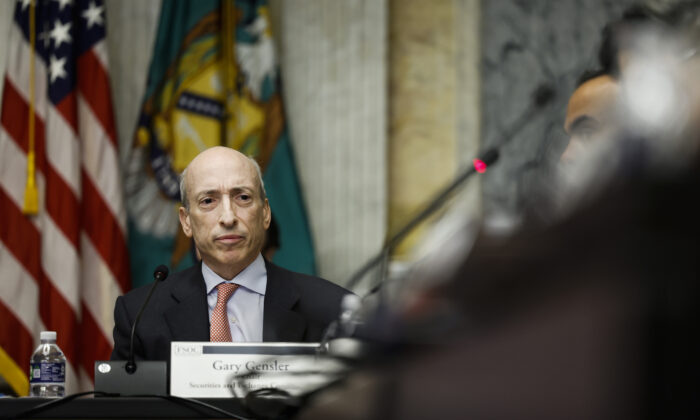The central characters in this drama included committee chair Rep. Patrick McHenry (R-N.C.), Gary Gensler, the chair of the SEC, and Rep. Maxine Waters (D-Calif.), the former chair of the Financial Services Committee who has come under fire for her close relationship with Sam Bankman-Fried, the disgraced founder of now bankrupt crypto exchange FTX.
In what appears to be a regulatory land grab, Gensler is positioning the SEC as the primary enforcer of crypto regulation in the absence of clear legislative guidance from Congress. Indeed, under Gensler’s leadership, the SEC has brought around 50 separate enforcement actions against crypto-related entities and individuals.
In his testimony, Gensler repeatedly referred to the SEC as the “cop on the beat,” telling the committee that he was “watching out for your constituents.” If the SEC is the cop on the beat, then the officer has been dozing off for most of it. Indeed, the SEC was asleep at the wheel for many of the major crypto disasters and frauds over the course of 2022, including most notably the alleged massive corruption at FTX. Gensler and his staff met in consultation with FTX’s founder on multiple occasions over the year before FTX’s collapse to discuss how to bring digital assets under SEC’s regulatory authority. FTX may have believed this would result in a quid pro quo in which FTX would receive special treatment that would position FTX ahead of its competitors.
In the absence of legislation, Gensler is practicing regulation by enforcement. This is akin to arresting someone for speeding when there are no speed limits posted, simply because the officer thinks the driver should have known better. That isn’t how laws are supposed to work in this country.
The crypto industry has been appealing for regulatory and legislative guidance for years. Instead, its members, including Coinbase, the U.S. publicly listed crypto exchange already under SEC oversight, have recently been handed Wells Notices from the SEC informing them they are being investigated and implying an indictment is likely to follow imminently.
In Coinbase’s case, the CEO noted that the company met with the SEC over 30 times in the nine months before it received a Wells Notice, in the hopes of receiving regulatory clarity from the commission. Instead of providing guidance and rules that could be followed, Gensler now wants an additional $78 million in funding for enforcement.
Members of the committee criticized Gensler for not providing clear regulatory guidance on whether “digital assets offered as part of an investment contract are subject to securities laws.” Most importantly, Gensler refused to answer the fundamental question of whether he believes that Ethereum’s digital token (ETH) is a security. This is one of the most basic issues lawmakers and regulators must address to provide clarity to crypto entrepreneurs, exchanges, and investors alike.
Ethereum has been around for 10 years, has a market capitalization of nearly a quarter of a trillion dollars—representing 20 percent of the entire crypto market—and is the second largest cryptocurrency after Bitcoin (BTC). While smaller today, Ethereum may matter more than Bitcoin over the long run because Ethereum is viewed as having a wider set of use cases and as a building block for numerous practical applications.





